For Online Newshour,
Alexia Elejalde-Ruiz reports:
The Cuban government, controlled exclusively by President Fidel Castro's Cuban Communist Party (PCC), has allowed some market-style reforms in an attempt to control an economic crisis that has plagued the country since the Soviet Union's collapse in 1989.
The USSR's fall eliminated the sizable subsidies that Cuba had received from its communist benefactor. Between 1989 and 1993, the country's gross domestic product declined by 35 percent. The health care system, long praised for providing universal coverage, has suffered as medicines and basic supplies became scarce.
Since 1993, the economy has expanded 26.2 percent, but living conditions remain well below 1989 levels. The unemployment rate was down to 5.8 percent in 2000, the lowest in ten years, and the average monthly wage climbed by six percent. Seventy percent of employees on the budgeted payroll received wage hikes of between 15 and 50 percent, and labor productivity rose six percent.
Among Cuba's recent economic reforms was official dollarization in August 1993, legalizing the possession and use of American currency. But the move widened the economic gap between those with access to dollars and those without. When the government set up state-run dollar stores to sell food, clothing and household items, the amount and variety of goods available at state-run peso stores declined.
The new reliance on dollars has caused people to covet jobs that earn dollar salaries or tips. It is not uncommon for doctors, engineers and other professionals to work for restaurants or as taxi drivers, because such occupations can be more lucrative than their peso-based professions. Dollarization has also reportedly caused growth of the informal dollar-based economy -- a flourishing black market and an increase in workplace theft and prostitution.
Investing in Cuba
The opening of the Cuban economy has prompted a significant investment, particularly in the tourism industry. In 370 joint ventures, businesses from countries such as Spain, Canada and Italy have invested over $4 billion in international tourism, nickel and oil production and telecommunications. The U.S. maintains its 40-year-old embargo on trade and financial transactions.
In 2000 there was an 11 percent increase in exports of goods and services, mostly due to larger sales of traditional sugar and nickel products and to the growing popularity of tourism. There were 1.6 million visitors to Cuba in 2000, up 10 percent from the year before.
But investors are constrained by the 1996 U.S. Cuban Liberty and Solidarity Act, more commonly known as the Helms-Burton Act. One of the act's components provides sanctions against those businessmen who traffic in property once owned by American citizens, but federalized when Castro took power. Over a dozen companies have pulled investments out of Cuba due to threatened action under the Helms-Burton Act.
Yet still investment grows, and so does the number of legally registered self-employed individuals. Artists, real estate lessors, small-scale sugar producers and tobacco farmers are among the 150 occupations that the government has allowed people to pursue privately. For example, 90 percent of Cuba's tobacco is now grown by 30,000 private farmers.
Despite the legality of private enterprise, the government maintains certain controls. Castro's government sets monthly fees that must be paid regardless of income and conducts frequent inspections. Critics of the government say they use these efforts to squeeze people out of private business and back to the public sector.
Three quarters of the labor force is still employed by the state, and social expenditure continues to be a large share of total spending. Twenty-three percent of the GDP goes to funding welfare programs, education, housing, community services, defense, and public order.
Despite the government's dedication to social services, little new housing has been built in Cuba since the 1960s, when Castro solidified his control over the island. Often, three generations live in one apartment, and multi-family occupation of unsafe housing is common. It is believed that these housing shortages may contribute to the remarkably high divorce rate among Cubans.
Transportation has reportedly suffered similar neglect. Few new vehicles have been brought into Cuba since the 1960s, so most people who have cars drive pre-Castro American relics or build cars from old parts. Old buses, called guaguas, and new buses, called camellos, navigate the island crammed with passengers. Bicycles and taxi-bikes are common, and in the cities some people still use horse-drawn carriages. The 30 percent of the population that lives in rural areas usually ride oxen, donkeys or mules. And 100-year-old steam trains carry sugar cane between towns.
Ideology and education
Success in Cuba often depends on an individual's devotion to the Castro government. High-level official positions are typically reserved for those who demonstrate a loyalty to the Communist Party, the sole legal party.
The Cuban constitution states all legally recognized civil liberties can be denied to anyone who opposes "the decision of the Cuban people to build socialism," while the Ley de la Peligrosidad, or Endangerment Law, says anyone who poses a threat to the system can be arrested and incarcerated without due process. There are reportedly between 300 and 500 "prisoners of conscience" currently being held in Cuban jails.
The government routinely monitors people's level of "ideological and political integration." Groups organized by city block, known as Committees for the Defense of the Revolution, supervise such socialized tasks as recycling, health campaigns and street night patrol.
Men are required to perform two years of military service between the ages of 16 and 30, although he government has recently added the option of doing agricultural work instead. Throughout their lives, Cuban citizens are encouraged to join government organizations that require them to perform voluntary work in the fields.
The educational system, long hailed as a great advancement of the socialist society, provides universal education and boasts a 95 percent literacy rate, the highest among the Latin American countries.
In addition to evaluating students according to traditional academic standards, teachers assess students and their parents according to their level of political and ideological integration. Any blot on the Cumulative Academic Record means they can be refused access to higher education or the right to freely choose a career.
The government also monitors the population through a Labor Record, which documents ideological conduct, and through mandatory identification cards. Citizens must obtain government permission in order to change homes or jobs.
Exiting the island
Many people who are unhappy with the government's tight control over their daily lives have tried to flee the island. Since Castro overthrew dictator Fulgencio Batista in 1959, over one million Cubans have gone into exile legally.
Many have tried to make the journey to the U.S., just 90 miles across the Florida Straits, in makeshift boats or rafts. Thousands have died in the shark-infested waters, been recaptured by the Cuban government, or turned back by the United States. Between 25 - 33 percent of people who have tried to escape have succeeded.
In August 1994, Castro gave his consent to allow anyone to leave the island. Thirty-five thousand people attempted the trip. In the summer of 1999, the de facto U.S. embassy in Havana held a lottery to provide 15,000 people with immigration visas for the United States. Over 540,000 people, out of a population of 11 million, applied.
Tuesday, July 31, 2001
| [+/-] |
Life in Cuba |
Wednesday, July 18, 2001
| [+/-] |
Blaming The Blockade |
Online NewsHour reports:
PAUL SOLMAN: Dr. Erminia Valenzuela is a cardiac surgeon with a message.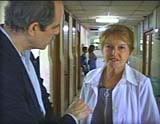 DR. ERMINIA VALENZUELA: I don't want to end this interview without asking the people of the United States to help us to end with the block.
DR. ERMINIA VALENZUELA: I don't want to end this interview without asking the people of the United States to help us to end with the block.
PAUL SOLMAN: The blockade.
DR. ERMINIA VALENZUELA: The blockade.
PAUL SOLMAN: The embargo.
DR. ERMINIA VALENZUELA: The blockade, the embargo. So I'm asking the people of the United States to help us to end the blockade.
PAUL SOLMAN: She runs this ward at Havana's top pediatric hospital, where children with serious heart defects come for surgery they can't get in the provinces. The care tops anything in the third world, she says, but could be much broader.
DR. ERMINIA VALENZUELA: If we are able to operate on 500 patients in a year, it would be enough in order not to have a waiting list.
Cuban health care
PAUL SOLMAN: They used to do 500 operations a year back when the Soviet Union subsidized the Cuban economy, including its medical care. They don't, however, blame the Russian pullout for the waiting list, but the U.S. blockade, or "block."
DR. ERMINIA VALENZUELA: With all these difficulties of the block, we had less money, and we had to decrease the number of operations to 50 percent or 60 percent.
PAUL SOLMAN: "Stop the blockade." It's a refrain we heard at almost every stop in Cuba, including Lenin High School.
STUDENT: Cuba is open to the world, and the world is almost open to Cuba, but we have, how can I say, a door closed for us.
PAUL SOLMAN: But isn't it socialism that prevents Cuba from becoming richer, we asked.
STUDENT: We got education, hospitals, medicines, all free, and if we want to be richer, we don't have to stop to get all of that. We only have to... You only have to stop this blockade.
The U.S. position
PAUL SOLMAN: We could go on, but you get the point: Even though Cuba now gets goods from all over the world, the U.S. embargo is still the number one excuse for Cuba's economic failings. Now, Cuba has actually lived with the embargo about as long as it's lived with socialism. In fact, the two are inseparable. When Fidel Castro first descended from the hills and toppled the Batista dictatorship in 1959, the Republican Eisenhower administration never imagined Cuba would soon be sleeping with the ideological enemy.
But within a year, Castro began nationalizing U.S. businesses. President Eisenhower-- a longtime friend of Batista-- retaliated by severing diplomatic relations, while the CIA initiated plans to assassinate Castro and invade Cuba. Eisenhower also set in motion an embargo on trade, made law by President Kennedy and Congress in 1962.
There have been opponents, like Jimmy Carter and the UN, which condemned it just last year by a vote of 163 to 3. But Miami's Cuban exile community and its allies in Congress have always prevailed. In 1996, Congress passed, and President Clinton reluctantly signed, the Helms-Burton Act, which among other provisions extended the penalties on trade with Cuba to companies and nations outside the U.S.
SEN. PHIL GRAMM: Our position has always been a commitment to isolation, the isolation of Cuba, and a commitment to overthrowing Fidel Castro. Today, with this bill, we go back to that policy and we hit Fidel Castro where it hurts the most. We hit him in the pocketbook.
PAUL SOLMAN: It's been a 40-year campaign, then, of U.S. economic pressure to topple Castro and install democratic capitalism, a campaign Castro has used for dramatic effect.
FIDEL CASTRO (Translated): What the imperialists want for us is nothing but capitalism, and worse still, the capitalism of the third world, of Guatemala and Honduras. But we'll defend our socialism at any cost.
PAUL SOLMAN: And defend it he has. But if Castro isn't quitting, neither is his opposition. (Crowd chanting) The key, according to anti- Castro forces outside Cuba, is to support anti-Castro forces inside the country-- build an anti-socialist opposition, like solidarity in Poland.
REP. LINCOLN DIAZ-BALART: There is a growing internal opposition movement that is being oppressed and repressed, thrown in dungeons on a day-in and day-out basis, and yet it has demonstrated extreme courage and is growing. That has to be the focus of our policy.
PAUL SOLMAN: To find out what the internal opposition itself makes of this approach, we went to see Cuba's best-known dissident. Elizardo Sanchez spent eight years in prison for crimes against the state. And yet, this is what he said:
ELIZARDO SANCHEZ (Translated): For 15 years, I have been in a group that has opposed these sanctions. They're unilateral actions of Washington against Cuba. For a long time, I was alone among dissidents in this view, but now nearly all of us oppose the U.S. policy.
PAUL SOLMAN: Arrested at gunpoint in the middle of the night for opposing Castro, Sanchez also opposes the policy on which his U.S. supporters pin their hopes.
ELIZARDO SANCHEZ (Translated): I believe the embargo is the best ally this totalitarian government has, because it justifies its failures. When there's no medicine or transport, or food, everyone says, "it's Washington's fault."
Blaming the embargo
PAUL SOLMAN: Indeed, the embargo is widely blamed for many, if not all of the country's economic woes. We heard that argument, among other places, at Cuba's version of the Federal Reserve, its Central Bank, where revolutionary hero Che Guevara once presided as the country's first Alan Greenspan. Francisco Soberon is now in charge, and maintains the embargo has cost Cuba decades of development.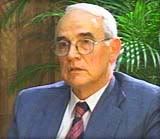
FRANCISCO SOBERON: It's a terrible cost, you see. It has to be measured in hundreds of billions, already.
PAUL SOLMAN: Hundreds of billions, you mean cumulatively?
FRANCISCO SOBERON: Accumulated during these 40 years.
PAUL SOLMAN: Soberon reorganized the bank to help implement market reforms after the Soviet Union-- and its huge subsides-- vanished in the early '90s. But he's still a devout socialist who blames the embargo for crippling Cuba's economy.
FRANCISCO SOBERON: We cannot go to an American bank to ask for a loan. But not only that, foreign banks, a lot of them have very close links with the American markets, and a lot of them feel that if they do business with Cuba, it could hamper their relations with the United States, and then they don't want to do business with us.
PAUL SOLMAN: Finance from abroad is key, says Soberon, because Cuba's own major investments have been in health care and in education; investments, that is, in "human capital," in Cuba's people, an asset of professional talent just waiting for the financial capital to make it world-class productive.
FRANCISCO SOBERON: 700,000 professionals, we have.
PAUL SOLMAN: 700,000 professionals.
FRANCISCO SOBERON: 700,000. And when I say "professionals," I mean people who have a university degree, you see?
PAUL SOLMAN: At a baseball game one night in Havana, we got yet another example of the embargo's cost.
MAN (Translated): You know, we've got this fight with the U.S. to buy oil, we have to get it all the way from Russia. Imagine if we could just get it from you, 90 miles away, how much easier and cheaper it would be.
PAUL SOLMAN: So then, the embargo would seem to be working, just as its supporters claim. But when we trekked to a far-off Havana neighborhood to interview another dissident, we again heard the message that the embargo is letting socialism off the hook and that trade with the U.S., according to Marta Beatriz Roque, would actually speed economic and political reform.
MARTA BEATRIZ ROQUE: I'm against the embargo. I would like that the embargo will be lifted.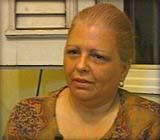
PAUL SOLMAN: Because?
MARTA BEATRIZ ROQUE (Translated): Because I believe Cuban society needs contact with North American society. We need to be in touch with capitalism.
Supporting the economy
PAUL SOLMAN: To the extent that Cuba is changing, many think, it's because of contact with the capitalist U.S., for better, or sometimes worse. And certainly, says Roque, economic contact with U.S. capitalism keeps the dissident community alive.
MARTA BEATRIZ ROQUE (Translated): I have family outside. I have support. Many friends in the U.S., especially in Miami, help us.
PAUL SOLMAN: As it happens, it's not just dissidents who get help from friends and family in the U.S. In Miami's Little Havana neighborhood, business at Western Union is brisker than ever these days.
MAN (Translated): With Western Union, you can send up to $100 a month to any one person.
PAUL SOLMAN: This Cuban exile, who preferred not to give his name, came to the states 12 years ago and has been sending dollars back home ever since.
MAN (Translated): I sent money to my parents so they could come and visit, and they did. Now I have to wait three more months before I can send any more.
PAUL SOLMAN: Again, back in Havana, dissident Elizardo Sanchez:
ELIZARDO SANCHEZ (Translated): I would say that 20 percent to 30 percent of what Cubans manage to get to survive comes from remittances -- my family included.
PAUL SOLMAN: What percent of your income-- family income-- comes from remittances?
MAN (Translated): Eighty percent. It's been that way for 20 years.
PAUL SOLMAN: Remittances-- what the Cubans call ramesas-- may actually be the single biggest source of dollars in what's becoming a dollarized country. You can use them to buy your own car, or to take a taxi instead of waiting for the so-called "camels," the trucks modified to haul people that most Cubans are forced to rely on.
If you pay in dollars at Coppelia's ice cream parlor, you can skip the long peso line and sit in comfort with the tourists. The burgeoning well-stocked supermarkets are dollars-only, which relegates those without dollars to the state's own meager food stores, where the pickings are generally slim and where they wouldn't let us take pictures. What's more, the dissidents say, the government itself relies indirectly on remittances, via heavy taxes on the dollar economy, to help finance, among other things, the costly Cuban safety net in health care and education.
PAUL SOLMAN: Do you think remittances are keeping the government in business?
ELIZARDO SANCHEZ (Translated): Definitely. Remittances coming from the U.S. have substituted in part for the huge subsidy we got from the Soviet Union. Today the remittances represent more than sugar exports and tourism. They're the principle source of income for the government. The total now comes to between $800 million and a billion dollars a year.
PAUL SOLMAN: Moreover, exile economic support doesn't stop with wiring dollars from the U.S. While some who fled have vowed never to return, many do come back, as tourists, and tourism now makes up fully 5 percent of the Cuban economy. And furthermore, when the exiles return, they bring not just first world cash, but bundles of first world stuff for their families-- TV's, toasters, VCR's.
When you add it all up-- the purchases, the care packages, the tourism, the remittances-- it seems the exile community is tossing a lot of money over the wall they themselves helped build-- between 5 percent and 10 percent, by some estimates, of the entire Cuban economy. So Castro's foes outside Cuba support the embargo politically while perhaps undermining it economically. And Castro's supporters inside Cuba condemn the embargo, though it arguably serves as their best excuse.
ELIZARDO SANCHEZ (Translated): For decades, the government has liked to present an image of itself as a little David against a giant Goliath. The day they lift the embargo and normalize relations as you've done with Hanoi, for example, or China, that will be the beginning of the end for this government.
PAUL SOLMAN: Now, it's possible that dissidents like Sanchez may be wrong about the embargo's effects, that the government's efforts to end the blockade are genuine. At the same time, the message we kept hearing-- from street level to the highest ranks of government-- was that the policy intended to bring Cuba to its knees may in fact have done quite the opposite.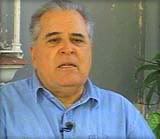
FRANCISCO SOBERON: The blockade, or the economic war of the United States, has been terrible for us, no? But the good part of it is that it has made us stronger, because we have... When you have to fight, when you have to face more big challenges, then you become stronger.
PAUL SOLMAN: A sobering thought on a U.S. policy that Cuba, after four decades, appears not only to have survived, but to have turned to at least rhetorical advantage.
JIM LEHRER: On Tuesday, President Bush announced he would not enforce a section of the 1996 Helms-Burton Act. It allows Americans to sue foreigners who invest in properties confiscated by the Cuban government.
Tuesday, July 17, 2001
| [+/-] |
Capitalism in Cuba |
Paul Solman reports from Cuba on the growing role of capitalism in the country's socialist system: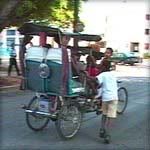
PAUL SOLMAN: For the newcomer, Cuba, and especially Havana, is a surprise. Yes, there are plenty of the expected third-world vignettes: The make-work jobs, the makeshift travel arrangements, a public transportation system bursting at the seams, the occasional beggar in the street-- this one was deaf. Reminders that as recently as a decade ago when the Soviet Union collapsed and its subsidies vanished, people were nearly starving here. But today a major makeover is in progress.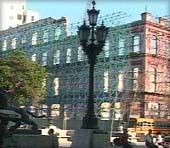 Opening doors to tourism
Opening doors to tourism
Cuba has decided to sell its culture, its climate, its beaches to foreigners, and so tourists are pouring in all over the country, from all over the world. Hotels abound, especially in Havana, and new ones are going up, built by everyone from the Spanish to the Chinese. Joint ventures with the Japanese and Koreans have brought in household gear you might see at Electronic Eddie's or Home Depot, and supermarkets offer an almost all-Cuban clientele everything from Brazilian diet Jell-O to Jack Daniels and Johnnie Walker Red. This year's sales at the Super Mercado...
ALBERTO LOTTI, Supermarket Manager (Translated ): Up to this moment, they are $6,324,000. The average bill per customer is $17.36.
PAUL SOLMAN: That's right. Here you pay not in Cuban pesos but in U.S. dollars, officially allowed after the Russians pulled out. Tourism and foreign investment contribute to dollars now reaching, it's estimated, more than half the Cuban population. In short, it seems like capitalism is taking root. (Pig snorting) on the other hand, many Cubans still think capitalists are pigs, business is dirty, and that all production should be sold to and through the state as these real pigs will be as soon as they fatten up.
PIG FARMER (Translated ): The state gives me everything I need-- the grain, the breeding stock-- so my commitment is to them. Sometimes the private guys show up, but I don't trust their scale. With the state, I always have confidence.
PAUL SOLMAN: The state, meanwhile, still tries to command the economy. Every family gets subsidized food with a national ration book. Fidel Castro has banned billboard advertising, making Havana look like some sort of Soviet throwback featuring Che Guevara, and slogans like "This is the socialist revolution right under the nose of the U.S." And when we tried to interview a would-be emigrant, the police stopped us, took our documents, and wanted to take us downtown. We sneaked these shots from our van. True, the government itself didn't object to our interviewing prominent dissidents like Elizardo Sanchez, but the dissidents themselves insisted Cuba's less free than ever.
ELIZARDO SANCHEZ, Dissident (Translated ): What we have here is closer to the Soviet totalitarian system, an absolute state monopoly that controls virtually everything down to the barbershops.
PAUL SOLMAN: In Cuba, then, an economics correspondent can feel whipsawed. At some moments you think Castro has saved Socialism, and right under Uncle Sam's nose. At other times it seems clear the free market is burrowing irresistibly from within. This elite Lenin High School, we figured, might be one place to sort things out. Only one in 100 is admitted here in a country with a whopping 99 percent literacy rate. At Cuba's training ground for the next generation, a group of English speakers awaited them.
STUDENT: Schoolmates, I tell you, you're welcome, and I hope you get satisfied with our school, with out students, with us. Thank you.
PAUL SOLMAN: Well, thank you.
PAUL SOLMAN: We got the red carpet treatment and it kept getting redder.
STUDENT: We don't want capitalism. We have... We want socialism, because we want equality to all the people.
STUDENT: We don't want to be like the United States because right now we have fewer children in streets... I mean, I would say, almost anywhere, almost no kids in street asking for money.
STUDENT: We are the same people. We have the same clothes, the same things. It's not that the other countries that you're better than me because you have a new Adidas and I don't.
PAUL SOLMAN: The kids at Lenin High seem determined to sustain socialist equality at almost any cost. As for the market changes Cuba has made?
STUDENT: We don't want those changes. We have to put them there... They're there because we need them. When we don't... If we don't need them anymore, we will fade it.
PAUL SOLMAN: Fade it.
PAUL SOLMAN: They will fade it-- that is, phase out the market reforms of the post-Soviet special period. Now maybe the reforms are temporary, and schools like this will restore Cuba's purist past, or maybe instead Cuba's many private markets are already beyond a point where anyone can fade them. Food production has exploded, for instance, because of free market incentives that let farmers sell privately some of what they produce. So incentives work.
MAN (Translated): Clearly, yes. It's obvious. That's the way it works everywhere.
Stark contrast in ideologies
PAUL SOLMAN: Incentives not only mean more food more available without waiting on line, they also mean better food at the private markets.
SALESMAN (Translated): It's better quality. This is what people are looking for. There's less fat. There's less bone. Do you understand?
PAUL SOLMAN: The more we saw of Cuba, the starker the contrast between capitalist experiment and socialist ideology. Alberto Lotti, for instance, who runs this state-owned dollar store, plays by market rules like pursuing profits in competition with similar stores.
ALBERTO LOTTI (Translated): Competition exists, and it's good for the consumer. Competition is about who offers the best product, the best quality, at the best price in the battle to lower costs. That's what satisfies consumers' needs.
PAUL SOLMAN: But of course, needs are always being redefined more broadly in an economy where there's more to buy. Do you worry that you'll become too much of a consumer society if you have more and more of these things?
ALBERTO LOTTI (Translated): I think this is not a consumer society. Economic development itself requires monetary mercantile exchange.
PAUL SOLMAN: Muchas gracias.
PAUL SOLMAN: So not capitalist, but not really socialist either; in fact, a distinctly Cuban straddle concluded with a distinctly Cuban sendoff. Meanwhile, in Lotti's parking lot, there was more evidence that Cuba may become a consumer society as soon as it can afford to. In Cuba's famous health care system, we heard a similar mixed message. On the one hand, the head of the country's national cancer hospital says he devoutly believes in socialized medicine.
DR. ROLANDO CAMACHO, Cancer Specialist: Health is something that is the right of a human being. If you put it in the hands of the one depending of your pocket, that's terrible.
PAUL SOLMAN: Free health care and free education were recently hailed by the World Bank-- no friend of Castro's-- as model investments, yet this doctor thinks the forced move to the free market was good economic medicine.
DR. ROLANDO CAMACHO: In that sense, I believe it's a good thing. It starts to make people to face the reality and not to... Because we were so accustomed that the government provided everything. You just have to ask, 'I need this, I need this.' And we don't know from where it comes, how it costs, nothing like that.
PAUL SOLMAN: You even see socialism versus capitalism down at the old ballpark. Omar Linares is a slugging superstar who's had million dollar offers from U.S. teams, but turned them all down. Why?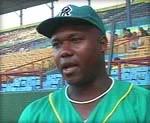
OMAR LINARES, Baseball Player (Translated ): I prefer to stay in Cuba because this is my country. Everything I've accomplished I owe to the revolution.
PAUL SOLMAN: On the field, the socialist party line; in the stands, however, entrepreneurship run rampant. Get a load of this transaction.
PAUL SOLMAN: Donde?
SALESMAN: Cuanto? Five dollars.
PAUL SOLMAN: Five dollars.
SALESMAN: Omar Linares?
PAUL SOLMAN: No, it doesn't say Linares. There's a different name.
SALESMAN: ( Speaking Spanish ) ( translated ): It's the way he signs. He does it real fast.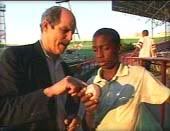
PAUL SOLMAN: He signs with another name?
SALESMAN: ( Translated ): I don't know. Maybe he was in a hurry.
Encouraging and resisting capitalism
PAUL SOLMAN: In fact, capitalists were budding everywhere we looked. Bottle collectors moonlighting from state jobs who wouldn't talk on camera, stilt walkers who wouldn't tell us what they earned. It's about art, they sniffed, not commerce; then complained when we made a donation that we'd underpaid them. And then there was this paledar, one of the small private dollar-only restaurants that dot Havana. When it comes to moving the merchandise here, Cuba's favorite cocktail, say, the mojito, owner Juan Carlos uses very clear market incentives.
JUAN CARLOS (Translated ): If my waiters sell more mojitos, they get paid more money. But if they bring the mojito to the table and it's not properly prepared, I fine them.
PAUL SOLMAN: You could call this capitalism with a vengeance. The government tolerates it, but puts legal hurdles in the paledar's path to protect the many state-owned restaurants.
JUAN CARLOS (Translated ): A private restaurant can only sell certain things. You can't sell beef or lobster. You can only have 12 seats.
PAUL SOLMAN: Some paledars like this one, whose identity we promised not to reveal, have responded with hidden rooms. Others have simply given up. And that makes Elizardo Sanchez believe the capitalist experiment in Cuba is about to end.
ELIZARDO SANCHEZ: Ahora. (Translated ) Today there's less free enterprise than there was three years. Paledars are closing down. They can't survive. Their workers are unemployed or working for the state.
PAUL SOLMAN: Sanchez spent eight years in prison for his politics. He's sure Cuba won't let capitalism do its thing.
ELIZARDO SANCHEZ (Translated ): The situation has changed in Cuba, but sadly it has changed for the worse rather than the better-- especially with regard to human rights.
PAUL SOLMAN: But you're now not in prison...
ELIZARDO SANCHEZ (Translated ): True. There have been some small steps, but nobody can be sure that tomorrow things won't change back.
PAUL SOLMAN: And yet capitalism continues to make inroads, it seems, almost everywhere; even in Cuba's creaky sugar industry, with nearly half a million workers, the country's largest. Having arrived in 1511, the Spanish decided to satisfy Europe's sweet tooth by transplanting sugar cane from the East Indies and slaves from Africa.
At this factory they lived in these very barracks. Sugar has been the backbone of the Cuban economy ever since. At this mill outside Havana, the propaganda was as abundant as the cane, but here, too, they've changed to market practices like incentive pay. They just insist the changes won't change them.
JOSE ANTONIO SANCHEZ, Sugar Mill Foreman (Translated}): The more we produce, the more we can offer salary and other benefits to our workers.
PAUL SOLMAN: This sounds like capitalism.
JOSE ANTONIO SANCHEZ (Translated ): Hey, we're surrounded by capitalism. We don't have much choice but to apply some of the formulas of capitalism to resolve our problems.
PAUL SOLMAN: Do you worry that the more capitalist techniques you use, the less socialism you'll have?
JOSE ANTONIO SANCHEZ (Translated): No. These are just methods of organizing production. We still have our benefits: Social equality, health care and education for all. We are not making any concessions to capitalism; all we're doing is applying certain techniques.
PAUL SOLMAN: But can social equality hold out as the market marches in? Our search for an answer brings us back to the émigré we were trying to interview when the police stopped us. Medical Dr. Giselle Castro-- no relation-- lost her job when she applied to leave for the U.S. Lord knows she's no fan of Socialism. But what did she complain to us about? Growing market inequality in Cuba.
DR. GISELLE CASTRO, Physician (Translated ): What's happening here is that those who have now have more, and those that don't continue to slide. Right here on this block you can see the inequality. Look at the differences between that house across the street and the one down the block-- that house and that house, they're different classes.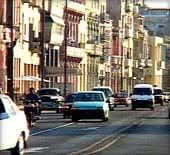
PAUL SOLMAN: You can see the inequalities, says Giselle Castro, and we could and did. In the end, this new fact of Cuban life-- the growing gulf between those with access to dollars and those without-- may well prove to be the core of the country's dilemma. It's a dilemma now so widespread it provides the punch line to what may be Cuba's hottest joke, about a girl who dumps her boyfriend. "He swore he'd struck it rich at the Hotel Nacional," she gripes, "claimed he'd actually landed the job of doorman." But she dropped him when she learned the bitter truth, that he was just another Cuban neurosurgeon -- a state job, that is, with no ties to the dollar economy.
So, in the end we were left with one big question: can Cuba, or any planned economy for that matter, encourage the free market and resist it at the same time? The only sure bet is that Cuba will grapple with that question for some time to come.
Monday, July 16, 2001
| [+/-] |
The Helms-Burton Act |
Today, President Bush enacted a six-month waiver of provisions of the 1996 Helms-Burton Act that would allow lawsuits against foreign companies who deal with Cuban businesses once claimed by U.S. nationals.
The Online NewsHours reports:
The act, sponsored by U.S. Sen. Jesse Helms (R-N.C.) and Rep. Dan Burton (R-Ind.), also formalized the U.S. trade embargo of the island nation, in effect by presidential order since the Kennedy administration.
Helms-Burton's lawsuit provision has been one of the act's most controversial components. It was meant to keep foreign investors away from nearly 6,000 formerly American-owned companies in Cuba brought under government control following the 1959 Cuban revolution. Those companies are now valued at over $6 billion.
President Clinton signed the legislation less than a month after Cuban air force jets shot down two American planes over international waters - dealing yet another blow to U.S. relations with Cuba. Four Cuban exile activists died in the incident.
Despite the broad powers in Helms-Burton, no one has ever filed suit under the law because former President Clinton suspended that portion of the legislation before it took effect in Aug. 1996. He renewed his suspension every six months, as the law allows, until the end of his term.
Opposition
Clinton's decision to hold off on the lawsuit proposals came after the European Union and Canada announced their opposition to the act. They argued the provisions violate international trade treaties by punishing foreign companies for business conducted outside U.S. borders. The E.U. brought its case to the World Trade Organization, but dropped its legal challenge in 1998. The U.S. and E.U. are still working toward an agreement on the issue.
Among the companies that could be affected are some Mexican and Italian firms with a stake in Cuba's telephone network -- originally built by an American company in the 1950s. Some executives from Canada's Sherritt International Corp., that invested in a nickel mine once operated by an American mining company, have already been prohibited from traveling to the U.S. in accordance with the act.
Large-scale foreign investment in Cuba is a relatively recent development. Canadian, Mexican and European firms moved in after Cuban President Fidel Castro opened the island nation to foreign investment in 1991. Foreign companies have invested billions of dollars in Cuba, much of it going into hotels, utilities, and other businesses formerly once controlled by Americans or Cubans now living in the U.S.
Provisions of the 1996 Helms-Burton Act
Title I: Formalizes the U.S. embargo on trade and financial transactions.
Title II: Outlines American policy and economic assistance towards a future transition or democratic Cuban government.
Title III: Allows lawsuits in American courts against foreign companies who invest in businesses once owned by Americans or by Cubans now living in the U.S. The president can suspend the lawsuit provision for 6-month periods.
Title IV: Authorizes the banning of executives of the foreign companies targeted in Title III from entering the U.S. Also allows denial of entry to the executives' families and the companies' shareholders.